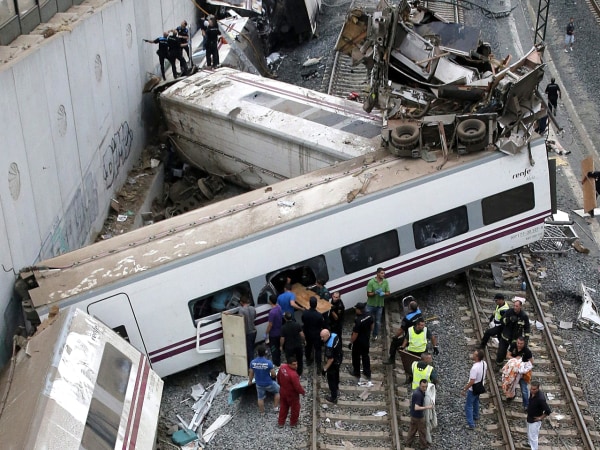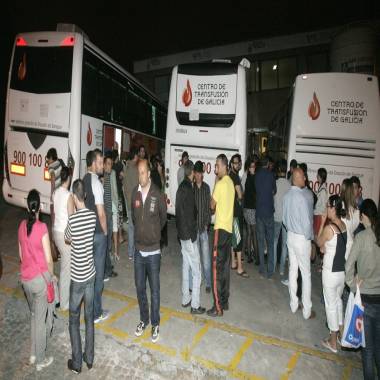
Lavandeira Jr / EPA
Scores are killed and injured in a train derailment in NW Spain.
By Becky Bratu and Alastair Jamieson, NBC News
At least 77 people were killed and up to 145 injured when a high-speed train crashed in northwest Spain on Wednesday, triggering an investigation into reports that it was going too fast on a tight curve.
Images from the scene showed bodies covered in blankets and towels lying next to toppled and crushed carriages as a plume of smoke billowed from the wreckage near Santiago de Compostela. Rescuers worked to pull survivors out of broken windows.
"It was going so quickly. ... It seems that on a curve the train started to twist, and the wagons piled up one on top of the other," passenger Ricardo Montesco told Cadena Ser radio station, according to Reuters.
El Pais newspaper cited sources close to the investigation saying the driver stated immediately after the crash that he had been traveling at 118 mph on the curve, which had a speed limit of 49 mph.
Trapped in his wrecked cab, he reportedly told supervisors over the radio: ?"We're human! We're human," according to El Pais. "I hope there are no fatalities because they will fall on my conscience,"?he said, according to the newspaper?s source. NBC News was unable to immediately confirm the report.
There are reports of as many as 100 people wounded and doezens dead in a train derailment in northwestern Spain. NBC's Brian Williams reports.
All of the bodies had been removed from the wreckage by Thursday morning, with hospitals treating 145 injured according to a 9:43 a.m. (3:43 a.m. ET) update via state broadcaster RTVE. Three of the wounded were still unidentified.
Local residents lined up to donate blood.
"The scene is shocking, it's Dante-esque," the head of Spain's Galicia region, Alberto Nunez Feijoo, said in a radio interview, according to Reuters.
A woman told RTVE that she had still been unable to locate a relative, who had been a passsenger on the train, despite calling local hospitals for more than? 12 hours.
?We don?t know where our brother is,? she said. ?I spent the night calling all the hospitals in Galicia, all the numbers they?ve given us. And nobody tells us anything, absolutely nobody.?
The crash, which happened at 8:41 p.m. local time (2:41 p.m. ET) Wednesday, was Europe?s deadliest mainline train accident in more than 25 years.
It also cast a shadow of tragedy over the entire Galicia region, which had been due to celebrate a public holiday Thursday.
Santiago de Compostela had been preparing for the festival of Saint James, when thousands of Christian pilgrims from around the world pack the streets. It is likely the train was packed full with people traveling for the holiday.
Officials said all of the celebrations, including a traditional High Mass at the city?s centuries-old cathedral, were canceled.

Xoan Rey / EPA
A group of volunteers waiting to give blood to help those injured in the train accident close to Santiago de Compostela, Galicia, Wednesday.
"In the face of a tragedy such as just happened in Santiago de Compostela on the eve of its big day, I can only express my deepest sympathy as a Spaniard and a Galician," Prime Minister Mariano Rajoy said in a statement ahead of a visit to the crash site.
The eight-car Alvia express train was carrying 218 passengers from the capital, Madrid, to the city of Ferrol when it derailed about two miles short of Santiago de Compostela station, national train operator Renfe said in a statement.
Spain?s rail network is one of the most modern and successful in Europe, following decades of public investment in high-speed connections between key cities.
Transport expert and author Christian Wolmar said it was not clear if high-tech safety systems, which override inputs by the driver, would have been in use at the time.
?On high speed lines, the European Train Control System should automatically correct the speed of the train, but this accident may have happened on a stretch of line which is not designated as high-speed,? he said.
Reuters reported that the mayor of Santiago Angel Curras told Cadena Ser radio: "It seems the speed of the train was likely not the right one."
Rail workers? union SEMAF expressed ?support for the comrade who has been implicated in this accident? as well as ?condolences? to the victims, according to RTVE.
The crash is Spain?s biggest disaster since the 2004 terror attack at Madrid?s Atocha station that left 191 dead.
In November 2000, 155 people were killed when a fire in a tunnel engulfed a funicular train packed with skiers in Austria.
In Montenegro, up to 46 people were killed and nearly 200 injured in 2006 when a packed train derailed and plunged into a ravine outside the capital, Podgorica.
NBC News' Brinley Bruton and Jason Cumming and?Reuters contributed to this report.?
This story was originally published on Wed Jul 24, 2013 9:23 PM EDT
Cyber Monday 2012 Walmart.com detroit lions Thanksgiving Day cooking a turkey toysrus how to carve a turkey
No comments:
Post a Comment
Note: Only a member of this blog may post a comment.